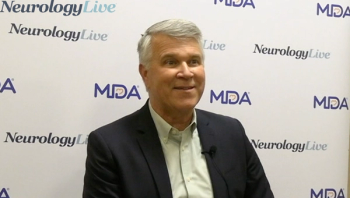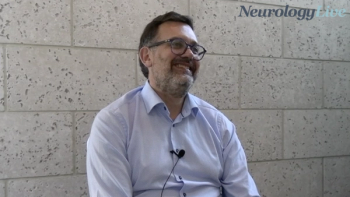
Donovan Decker, recipient of the 2025 MDA Legacy Award for Community Impact and Research, shared his powerful journey as a patient advocate and gene therapy pioneer, shedding light on the challenges and progress in LGMD.

Donovan Decker, recipient of the 2025 MDA Legacy Award for Community Impact and Research, shared his powerful journey as a patient advocate and gene therapy pioneer, shedding light on the challenges and progress in LGMD.

Two separate long-term extension studies met their pre-specified endpoints, showing highly significant evidence of sustained treatment benefits in slowing disease progression in pediatric and adult patients.

The design of a phase 2 trial to investigate the potential of satralizumab in boys with Duchenne muscular dystrophy was recently presented at the 2025 MDA Clinical & Scientific Conference.

The phase 3b STRENGTH study reported that a single dose of OAV101IT was well tolerated in treatment-experienced patients with spinal muscular atrophy, with motor function stabilizing over 52 weeks.

Real-world findings from the RESTORE registry presented at the 2025 MDA conference confirmed the established safety profile of onasemnogene abeparvovec over a 5-year period.

The chief scientific officer at Satellos Bioscience gave clinical insight on a new novel treatment and its mechanism of action in treating Duchenne muscular dystrophy. [WATCH TIME: 5 minutes]

Patient advocate and MDA Ambassador Lily Sander shared inspiring perspective on Charcot-Marie-Tooth disease, advocacy efforts, and the importance of connection

Long-term follow-up data from an early-phase study of an AAV8-based gene therapy for DMD suggest the treatment was well-tolerated and provided sustained biochemical and functional benefits.

The chief scientific officer at Avidity Biosciences provided clinical perspective on the function and mechanism of del-zota, an investigational antisense treatment in development for DMD amenable to exon 44 skipping. [WATCH TIME: 3 minutes]

Findings from the phase 2 FIGHT DMD trial suggest an investigational oral thromboxane prostanoid receptor antagonist may preserve heart function in patients with DMD-associated cardiomyopathy.

This phase 4 study on omaveloxolone will assess long-term maternal and infant health, potentially informing future safety guidelines for patients with Friedreich ataxia.

The MyacarinG study post-hoc analysis demonstrated rozanolixizumab's potential to significantly reduce ocular symptoms in gMG, with consistent improvements across multiple scoring systems.

Three patients treated with DT-DEC01 showed improvements in various functional tests, including echocardiography, arm movements, grip strength, and spirometry after 12-24 months of treatment.

In the study, most participants are aged 18-60, with 53% female and 73.1% carrying the c.826C>A mutation, while 15 patients are aged 12-18.

A recent study shows that eteplirsen, a drug promoting dystrophin production, significantly slowed the decline in heart function, specifically left ventricular ejection fraction, in patients with Duchenne muscular dystrophy.

Spanning 14 weeks, the study evaluates age-appropriate dosing, safety, pharmacokinetics, and clinical effects through once-weekly injections of efgartigimod PH20 SC in juvenile myasthenia gravis.

Over the 5-year period, treatment-related adverse events with the gene therapy were mild or moderate, with most occurring within the first 90 days after infusion.

The interim chief executive officer at the Consortium of Multiple Sclerosis Centers invites healthcare professionals to the Consortium’s annual meeting from May 28–31 in Phoenix, Arizona. [WATCH TIME: 2 minutes]

The associate researcher at the University of California, San Francisco discussed a refined EAE model that could better replicate MS pathology, enabling deeper insights into demyelination, neuronal loss, and remyelination. [WATCH TIME: 6 minutes]

The professor of neurology and neurosurgery at McGill University discussed the evolving understanding of neuroimmune interactions in MS, highlighting how these interactions contribute to disease progression and potential repair mechanisms. [WATCH TIME: 4 minutes]

The assistant professor in the department of neurology at Mount Sinai talked about a recent study that highlighted how socioeconomic status and diet could significantly impact physical and cognitive outcomes in patients with MS. [WATCH TIME: 2 minutes]

The professor of neurology at University of Colorado School of Medicine discussed the evolving landscape of MS treatment, highlighting the role of personalized medicine and biomarker-driven decision-making. [WATCH TIME: 5 minutes]

The instructor in the department of radiology at Weill Cornell Medicine discussed how structural and functional brain connectomes can potentially improve predictions of MS progression and treatment response. [WATCH TIME: 4 minutes]

A post-hoc analysis of patients from the CHAMPION-NMOSD trial revealed that the majority received their initial meningococcal vaccination within 6-months of their last rituximab dose.

The professor of neurosurgery and physiology at University of Colorado School of Medicine talked about how vagus nerve stimulation may promote remyelination and functional recovery in multiple sclerosis. [WATCH TIME: 4 minutes]

A late-breaking study presented at the 2025 ACTRIMS Forum reported that a modified Atkins diet reduced inflammation and altered immune cell metabolism in multiple sclerosis.

At the 2025 ACTRIMS Forum, the director of the MS Comprehensive Care Center at Stony Brook Medicine discussed the evolution of high-efficacy treatments for MS. [WATCH TIME: 4 minutes]

Data from more than 16,000 trial participants point to possible challenges with assessing and safely administering novel therapeutics among those with comorbidities—which may be present in as much as half of the patient population.

In the CAVS-MS study, 19% of participants with atypical or radiological-only presentations met the 2024 McDonald Criteria for MS, enabling earlier treatment initiation.

GFAP changes positively correlated with gadolinium-enhancing lesion volume (P = 0.18) and negatively with left ventricular volume (P = -0.19).